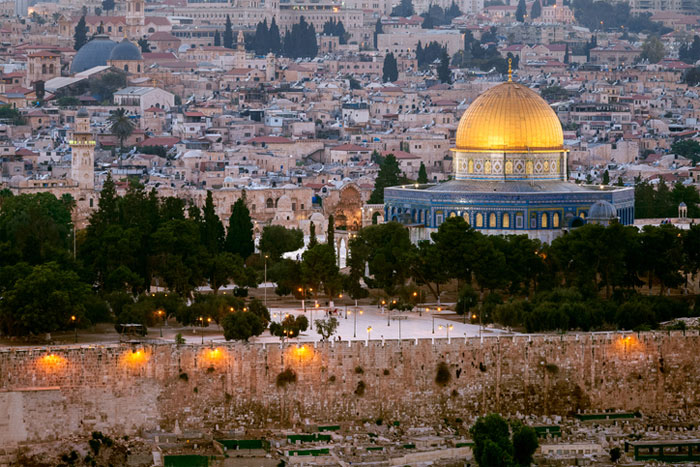 joe daniel price/Getty Images
joe daniel price/Getty Images Whether the capital of Ukraine should be called Kiev or Kyiv
is more immediate and maybe just as murky
as whether “Turkikiye” should be the name of Turkey;
or whether Bangkok, Thailand’s royal capital, should now receive
parentheses, preceded by the longest capital that’s in the Guinness
Book of Records — are dilemmas that I think far less
important than the name to give a very holy mess
that in Jerusalem now troubles pious people more than it does sinners.
Its most ancient name appears in Genesis and is Moriah,
the place where God told Abraham to save his son,
His ostensible command-to-kill undone;
no holiness than saving human lives is higher.
Ralbag, a great rabbi, claims that God’s original, unclear intention
was just that Abraham show Isaac how to offer
a sacrifice—of sacrifices a great scoffer
when they involve a victim of the tribe to which we all belong, called “Menschen.”
It’s where the Jewish Temple used to be, though many Muslims may deny it,
and a mosque and an Islamic Dome stand too.
Exactly what the mountain should be called I do
believe is not Al Aqsa, as most Muslims claim, but Har HaBayit,
“The Mountain of the House,” the Temple Solomon constructed after David
paid for the precious land. Destroyed
by Babylon, its memory has been enjoyed
for ages since the House of Holiness was not forever lost, and we must save it.
In “(Bangkok): A Push for Parentheses Miffs Thais (Who Have Bigger Problems),” NYT, 4/2/22, Hannah Beech writes about a debate in Thailand over whether the capital should be known internationally as “Bangkok,” after the old riverside settlement where she lives, or “Krung Thep Maha Nakhon.”
Gershon Hepner is a poet who has written over 25,000 poems on subjects ranging from music to literature, politics to Torah. He grew up in England and moved to Los Angeles in 1976. Using his varied interests and experiences, he has authored dozens of papers in medical and academic journals, and authored “Legal Friction: Law, Narrative, and Identity Politics in Biblical Israel.” He can be reached at gershonhepner@gmail.com.























 More news and opinions than at a Shabbat dinner, right in your inbox.
More news and opinions than at a Shabbat dinner, right in your inbox.